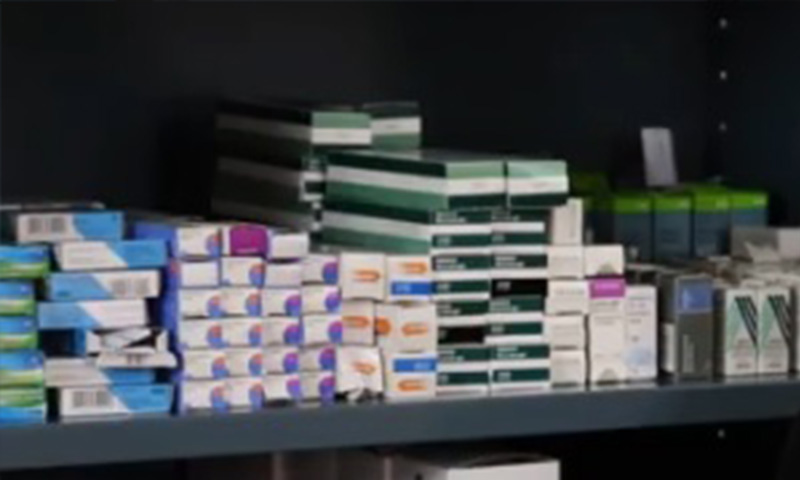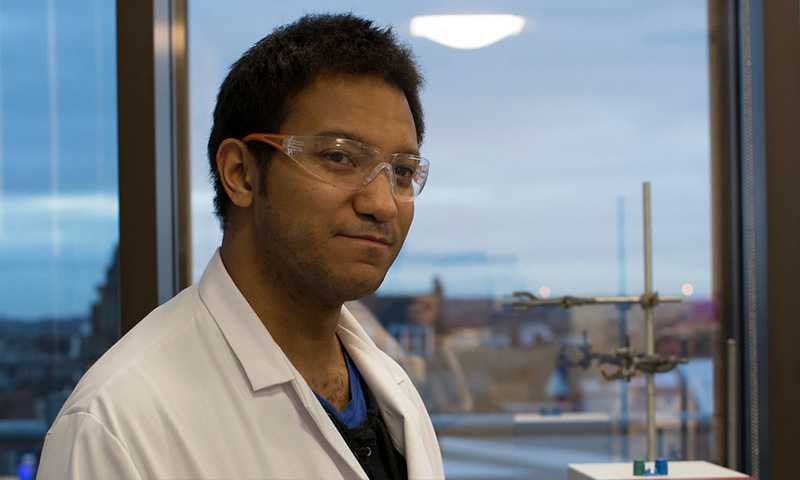Explore the knowledge and learn the technical skills of the word of drug discovery, analyses, development, and distribution in order to pursue a career in the pharmaceutical industry.
BSc (Hons) Pharmaceutical Science
This course equips you with the knowledge and technical skills for a career in pharmaceuticals, covering drug discovery, analysis, development, and distribution.
This course equips you with the knowledge and technical skills for a career in pharmaceuticals, covering drug discovery, analysis, development, and distribution.
Why choose this course?
What's unique about this course?
- Accredited by the Royal Society of Biology
- Access to state-of-the-art laboratory facilities
- Interactive learning spaces, including mock dispensary and consultation rooms
What happens on the course?
Year 1: Covers key topics such as infection and immunity, physicochemical science and pharmaceutical chemistry. It considers human health, physiology, and disease prevention and treatment. It looks at the molecular basis of disease and introduces you to a diversity of microorganisms, including bacteria, algae, protozoa, fungi and the viruses. In addition, you will begin the process of developing your transferable skills.
Year 2: Explores basic principles of drug development and considers practical applications of biochemistry and pharmacology. It looks at the role of pathogens and metabolic processes in the development of disease and identifies targets for drugs in the search for therapeutic agents. It also examines the relationship between protein structure and function and investigates spectroscopic methods of analysis as tools in drug design and development.
Year 3: Students are encouraged to undertake an industrial placement in the third year. Students can also progress directly to the final year which covers the principles of drug design and development that can achieve a therapeutic effect with minimal adverse reaction. It explores the diversity and complexity of membrane structure and function, looks at laboratory management and gives you the chance to undertake a research project of your choice.
Course Modules
Potential Career Paths
Additional Information
Everything you need to know about this course!
Pharmaceutical science is well established at Wolverhampton and benefits from a long tradition of teaching and research in the chemical and biological sciences.
This course gives students an excellent opportunity to study core science as well as the modern developments that are occurring at the boundaries between biology, chemistry and clinical practice.
The course has its own distinct identity, but also draws on expertise from other successful areas within the University, especially Pharmacy and Pharmacology.
An increasing amount of course material is delivered electronically at a time that best suits the individual student, but more traditional teaching methods, in particular laboratory-based work, play a key part. Students are encouraged to consider an industrial placement in their third year.
At the end of this course you, the student, will be able to:
- Apply a range of graduate skills to investigation in pharmaceutical science
- Design, implement and critically evaluate research in pharmaceutical science
- Critically evaluate modern concepts of disease and the contribution of new technologies to the treatment of disease
- Design and implement appropriate strategies for the manufacture and quality control of pharmaceutical dosage forms
| Location | Mode | Fee | Year |
|---|---|---|---|
| Home | Full-time | £9250 per year | 2022-23 |
| Home | Full-time | £9250 per year | 2022-23 |
| Home | Full-time | £9250 per year | 2023-24 |
| Home | Full-time | £9250 per year | 2024-25 |
| Home | Part-time | £3120 per year# | 2022-23 |
| Home | Part-time | £3120 per year# | 2022-23 |
| Home | Part-time | £4625 per year# | 2023-24 |
| Home | Part-time | £4625 per year# | 2024-25 |
| International | Full-time | £13450 per year | 2022-23 |
| International | Full-time | £13950 per year | 2022-23 |
| International | Full-time | £14950 per year | 2023-24 |
| International | Full-time | £15450 per year | 2024-25 |
The University is committed to a transparent fee structure, with no hidden costs, to help you make an informed decision. This includes information on what is included in the fee and how fees are calculated and reviewed
# Undergraduate part-time fees for 50% rate of study
- 96 UCAS points
- A Levels - grades CCC / BCD to include Chemistry at grade C
- BTEC L3 Extended Diploma or OCR Cambridge L3 Technical Extended Diploma in Applied Science or Biomedical Science - grades MMM
- Access to HE Diploma (60 credits) of which a minimum of 45 must be at Level 3 (96 UCAS point equivalence, minimum 45 credits at merit to include Maths, Chemistry and Biology)
Use the UCAS Tariff calculator to check your qualifications and points
Students must usually have studied for a minimum of two years post GCSE level. However, we will consider applications from mature students who do not have two years of post-16 study, where they have relevant work experience. Please see http://wlv.ac.uk/mature for further information.
If you've got other qualifications or relevant experience, please contact The Gateway for further advice before applying.
International entry requirements and application guidance can be found at http://www.wlv.ac.uk/international/apply
English language requirements also apply
Royal Society of Biology
"Accredited by the Royal Society of Biology for the purpose of meeting, in part, the academic and experience requirement of membership and Chartered Biologist (CBiol)."
Tuition Fees Loan (Home Fee Status):
Most students will be able to apply for a loans to pay for these subject to eligibility. To find out more information please refer to the government Student Finance website.
Changes for EU students:
The UK government has confirmed that EU students starting courses from 1 August 2021 will normally be classified as having Overseas Fee status. More information about the change is available at UKCISA:EU citizens living in the UK with 'settled' status, and Irish nationals living in the UK or Ireland, will still be classified as Home students, providing they meet the usual residency requirements, for more information about EU Settlement Scheme (EUSS) click here.
Self-funding:
If you don’t want to take out a loan to pay your fees or if you aren’t eligible to receive a loan, you might want to take advantage of the University’s scheme to pay by instalments: See How to pay.
For more information please contact the Gateway.Your employer, embassy or organisation can pay for your Tuition fees:
If your employer, embassy or organisation agrees to pay all or part of your tuition fees; the University will refer to them as your sponsor and will invoice them for the appropriate amount.
We must receive notification of sponsorship in writing as soon as possible, and before enrolment, confirming that the sponsor will pay your tuition fees.
Financial Hardship:
Students can apply to the Dennis Turner Opportunity Fund.
for help with course related costs however this cannot be used for fees or to cover general living costs.Bursaries and Scholarships:
In addition the University also offers a range of Bursaries and Scholarships packages
You can find more information on the University’s Funding, cost, fee and support pages.
How We Compare
Find out how our course is rated on Discover Uni, the official website for comparing UK higher education courses


/prod01/wlvacuk/media/departments/digital-content-and-communications/images-2024/Diane-Spencer-(Teaser-image).jpg)
/prod01/wlvacuk/media/departments/digital-content-and-communications/images-18-19/220325-Engineers_teach_thumbail.jpg)
/prod01/wlvacuk/media/departments/digital-content-and-communications/images-2024/241024-Dr-Christopher-Stone-Resized.jpg)
/prod01/wlvacuk/media/departments/digital-content-and-communications/images-2024/UoW-City-Campus-(Teaser-Image).jpg)
/prod01/wlvacuk/media/departments/digital-content-and-communications/images-2024/241014-Cyber4ME-Project-Resized.jpg)
/prod01/wlvacuk/media/departments/digital-content-and-communications/images-2024/240315-Research-Resized.jpg)
/prod01/wlvacuk/media/departments/digital-content-and-communications/images-2024/WMCA-event-(teaser).jpg)





